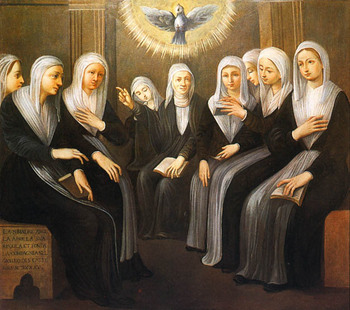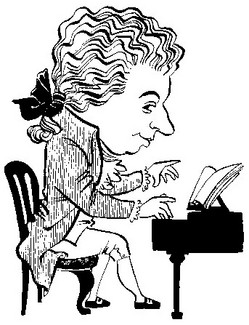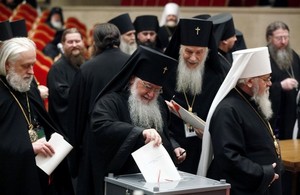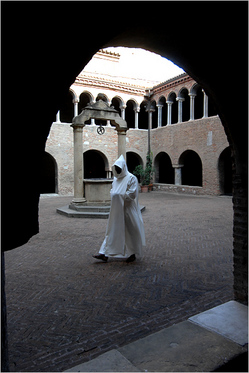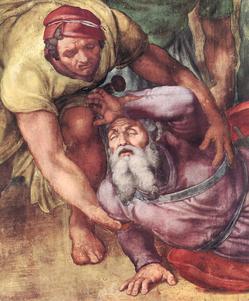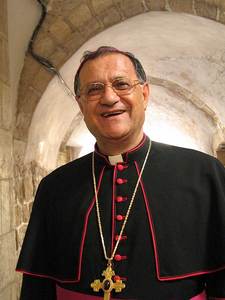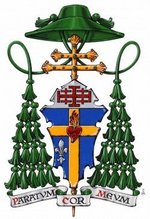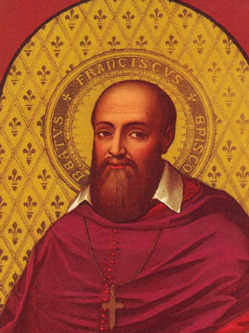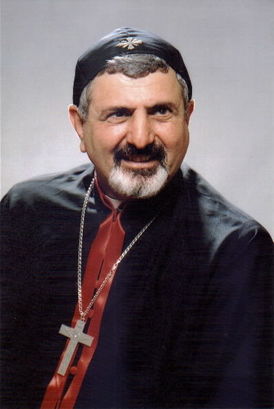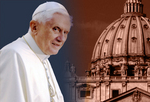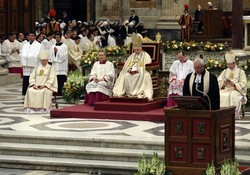 It is a great joy every time we find ourselves gathered at the tomb of the Apostle Paul on the liturgical feast of his conversion to conclude the Week of Prayer for Christian Unity. I greet all of you with affection. I greet in a special way Cardinal Cordero Lanza di Montezemolo, the abbot [Edmund Powers] and the community of monks who are hosting us. I also greet Cardinal Kasper, the president of the Pontifical Council for Promoting Christian Unity. I greet along with him the lord cardinals who are present, the bishops and the pastors of the various Churches and ecclesial communities gathered here this evening.
It is a great joy every time we find ourselves gathered at the tomb of the Apostle Paul on the liturgical feast of his conversion to conclude the Week of Prayer for Christian Unity. I greet all of you with affection. I greet in a special way Cardinal Cordero Lanza di Montezemolo, the abbot [Edmund Powers] and the community of monks who are hosting us. I also greet Cardinal Kasper, the president of the Pontifical Council for Promoting Christian Unity. I greet along with him the lord cardinals who are present, the bishops and the pastors of the various Churches and ecclesial communities gathered here this evening.
A special word of recognition goes to those who worked together in preparing the prayer guides, experiencing firsthand the exercise of reflecting and meeting in listening to each other and, all together, to the Word of God.
St. Paul’s conversion offers us a model that shows us the way to full unity. Unity in fact requires a conversion: from division to communion, from broken unity to healed and full unity. This conversion is the gift of the Risen Christ, as it was for St. Paul. We heard this from the Apostle himself in the reading proclaimed just a moment ago: “By the grace of God I am what I am” (1 Corinthians 15:10).
The same Lord, who called Saul on the road to Damascus, addresses himself to the members of the Church — which is one and holy — and calling each by name asks: Why have you divided me? Why have you wounded the unity of my body?
Conversion implies two dimensions. In the first step we recognize our faults in the light of Christ, and this recognition becomes sorrow and repentance, desire for a new beginning. In the second step we recognize that this new road cannot come from us. It consists in letting ourselves be conquered by Christ. As St. Paul says: “I continue my pursuit in hope that I may possess it, since I have indeed been conquered by Christ Jesus” (Philippians 3:12).
Conversion demands our yes, my “pursuit”; it is not ultimately my activity, but a gift, a letting
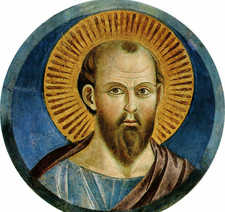 ourselves be formed by Christ; it is death and resurrection. This is why St. Paul does not say: “I converted” but rather “I died” (Galatians 2:19), I am a new creature. In reality, St. Paul’s conversion was not a passage from immorality to morality, from a mistaken faith to a right faith, but it was a being conquered by Christ: the renunciation of his own perfection; it was the humility of one who puts himself without reserve in the service of Christ for the brethren. And only in this renunciation of ourselves, in this conforming to Christ are we also united among ourselves; we become “one” in Christ. It is communion with the risen Christ that gives us unity.
ourselves be formed by Christ; it is death and resurrection. This is why St. Paul does not say: “I converted” but rather “I died” (Galatians 2:19), I am a new creature. In reality, St. Paul’s conversion was not a passage from immorality to morality, from a mistaken faith to a right faith, but it was a being conquered by Christ: the renunciation of his own perfection; it was the humility of one who puts himself without reserve in the service of Christ for the brethren. And only in this renunciation of ourselves, in this conforming to Christ are we also united among ourselves; we become “one” in Christ. It is communion with the risen Christ that gives us unity.
We can observe an interesting analogy with the dynamic of St. Paul’s conversion also in meditating on the biblical text of the prophet Ezekiel (37:15-28), which was chosen as a basis for our prayer this year. In it, in fact, the symbolic gesture is presented of two sticks being joined into one in the prophet’s hand, who represents God’s future action with this gesture. It is the second part of Chapter 37, which in the first part contains the celebrated vision of the dry bones and the resurrection of Israel, worked by the Spirit of God.
How can we not see that the prophetic sign of the reunification of the people of Israel is placed after the great symbol of the dry bones brought to life by the Spirit? There follows from this a theological pattern analogous to that of St. Paul’s conversion: God’s power is first and he works the resurrection as a new creation by his Spirit. This God, who is the Creator and is able to resurrect the dead, is also able to bring a people divided in two back to unity.
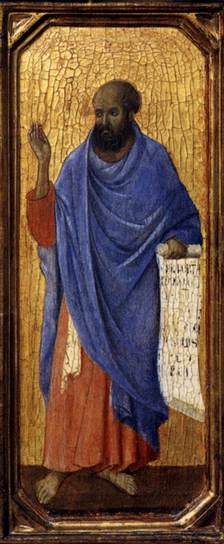 Paul — like Ezekiel but more than Ezekiel — becomes the chosen instrument of the preaching of the unity won by Christ through his cross and resurrection: the unity between the Jews and the pagans, to form one new people. Christ’s resurrection extends the boundary of unity: not only the unity of the tribes of Israel, but the unity of the Jews and the pagans (cf. Ephesians 2; John 10:16); the unification of humanity dispersed by sin and still more the unity of all who believe in Christ.
Paul — like Ezekiel but more than Ezekiel — becomes the chosen instrument of the preaching of the unity won by Christ through his cross and resurrection: the unity between the Jews and the pagans, to form one new people. Christ’s resurrection extends the boundary of unity: not only the unity of the tribes of Israel, but the unity of the Jews and the pagans (cf. Ephesians 2; John 10:16); the unification of humanity dispersed by sin and still more the unity of all who believe in Christ.
We owe this choice of the passage from the prophet Ezekiel to our Korean brothers, who felt the call of this biblical passage strongly, both as Koreans and Christians. In the division of the Jewish people into two kingdoms they saw themselves reflected, the children of one land who, on account of political events, have been divided, north from south. Their human experience helped them to better understand the drama of the division among Christians.
Now, from this Word of God, chosen by our Korean brothers and proposed to all, a truth full of hope emerges: God allows his people a new unity, which must be a sign and an instrument of reconciliation and peace, even at the historical level, for all nations. The unity that God gives his Church, and for which we pray, is naturally communion in the spiritual sense, in faith and in charity; but we know that this unity in Christ is also the ferment of fraternity in the social sphere, in relations between nations and for the whole human family. It is the leaven of the Kingdom of God that makes all the dough rise (cf. Matthew 13:33).
In this sense, the prayer that we offer up in these days, taking our cue from the prophecy of Ezekiel, has also become intercession for the different situations of conflict that afflict humanity at present. There where human words become powerless, because the tragic noise of violence and arms prevails, the prophetic power of the Word of God does not weaken and it repeats to us that peace is possible, and that we must be instruments of reconciliation and peace. For this reason our prayer for unity and peace always requires confirmation by courageous gestures of reconciliation among us Christians.
Once again I think of the Holy Land: how important it is that the faithful who live there, and the pilgrims who travel there, offer a witness to everyone that diversity of rites and traditions need not be an obstacle to mutual respect and to fraternal charity. In the legitimate diversity of different positions we must seek unity in faith, in our fundamental “yes” to Christ and to his one Church. And thus the differences will no longer be an obstacle that separates but richness in the multiplicity of the expressions of a common faith.
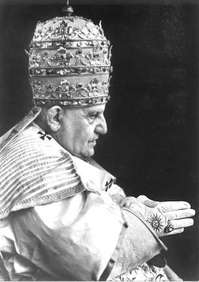 I would like to conclude this reflection of mine with a reference to an event that we older people here have certainly not forgotten. In this place on Jan. 25, 1959, exactly 50 years ago, Blessed Pope John XXIII announced for this first time his desire to convoke “an ecumenical Council for the universal Church” (AAS LI [1959], p. 68). He made this announcement to the cardinals in the chapter room of the Monastery of St. Paul, after having celebrated solemn Mass in the Basilica.
I would like to conclude this reflection of mine with a reference to an event that we older people here have certainly not forgotten. In this place on Jan. 25, 1959, exactly 50 years ago, Blessed Pope John XXIII announced for this first time his desire to convoke “an ecumenical Council for the universal Church” (AAS LI [1959], p. 68). He made this announcement to the cardinals in the chapter room of the Monastery of St. Paul, after having celebrated solemn Mass in the Basilica.
From the providential decision, suggested to my venerable predecessor, according to his firm conviction, by the Holy Spirit, there also derived a fundamental contribution to ecumenism, condensed in the decree Unitatis Redintegratio. In that document we read: “There can be no ecumenism worthy of the name without a change of heart. For it is from renewal of the inner life of our minds, from self-denial and an unstinted love that desires of unity take their rise and develop in a mature way” (7).
The attitude of interior conversion in Christ, of spiritual renewal, of increased charity toward other Christians, created a new situation in ecumenical relations. The fruits of theological dialogues, with their convergences and with the more precise identification of the differences that still remain, led to a courageous pursuit in two directions: in the reception of what was positively achieved and a renewed dedication to the future.
Opportunely, the Pontifical Council for Promoting Christian Unity, which I thank for the service it renders to all the disciples of the Lord, has recently reflected on the reception and future of ecumenical dialogue. Such a reflection, if on one hand rightly desires to emphasize what has already been achieved, on the other hand intends to find new ways to continue the relations between the Churches and the ecclesial Communities in the present context.
The horizon of full unity remains open before us. It is an arduous task, but it is exciting for those Christians who want to live in harmony with the prayer of the Lord: “that all be one so that the world believes” (John 17:21). The Second Vatican Council explained to us “that human powers and capacities cannot achieve this holy objective — the reconciling of all Christians in the unity of the one and only Church of Christ” (Unitatis redintegratio, 24).
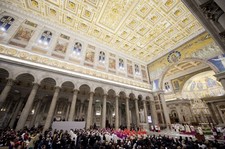 Trusting in the prayer of the Lord Jesus Christ, and encouraged by the significant steps made by the ecumenical movement, with faith we invoke the Holy Spirit that he continue to illumine our path. May the Apostle Paul, who worked so hard and suffered for the unity of the mystical body of Christ, spur us on from heaven; and may the Blessed Virgin Mary, Mother of the unity of the Church, accompany and sustain us.
Trusting in the prayer of the Lord Jesus Christ, and encouraged by the significant steps made by the ecumenical movement, with faith we invoke the Holy Spirit that he continue to illumine our path. May the Apostle Paul, who worked so hard and suffered for the unity of the mystical body of Christ, spur us on from heaven; and may the Blessed Virgin Mary, Mother of the unity of the Church, accompany and sustain us.
Pope Benedict XVI
Basilica of Saint Paul Outside the Walls
Vespers, Conversion of Saint Paul, 2009
